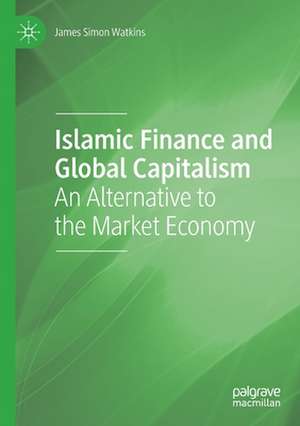Islamic Finance and Global Capitalism: An Alternative to the Market Economy
Autor James Simon Watkinsen Limba Engleză Paperback – 24 noi 2021
| Toate formatele și edițiile | Preț | Express |
|---|---|---|
| Paperback (1) | 602.82 lei 17-23 zile | +60.35 lei 5-11 zile |
| Springer International Publishing – 24 noi 2021 | 602.82 lei 17-23 zile | +60.35 lei 5-11 zile |
| Hardback (1) | 654.12 lei 6-8 săpt. | |
| Springer International Publishing – 24 noi 2020 | 654.12 lei 6-8 săpt. |
Preț: 602.82 lei
Preț vechi: 655.23 lei
-8% Nou
Puncte Express: 904
Preț estimativ în valută:
115.37€ • 119.100$ • 95.24£
115.37€ • 119.100$ • 95.24£
Carte disponibilă
Livrare economică 20-26 martie
Livrare express 08-14 martie pentru 70.34 lei
Preluare comenzi: 021 569.72.76
Specificații
ISBN-13: 9783030598426
ISBN-10: 303059842X
Pagini: 524
Ilustrații: XIX, 524 p. 12 illus., 11 illus. in color.
Dimensiuni: 148 x 210 mm
Greutate: 0.7 kg
Ediția:1st ed. 2020
Editura: Springer International Publishing
Colecția Palgrave Macmillan
Locul publicării:Cham, Switzerland
ISBN-10: 303059842X
Pagini: 524
Ilustrații: XIX, 524 p. 12 illus., 11 illus. in color.
Dimensiuni: 148 x 210 mm
Greutate: 0.7 kg
Ediția:1st ed. 2020
Editura: Springer International Publishing
Colecția Palgrave Macmillan
Locul publicării:Cham, Switzerland
Cuprins
Introduction - Is there an alternative?.- 1 In the beginning.- 2 From the swinging '60s to AI - the emergence of Islamic finance.- 3 2008 financial crisis - Did Islamic finance outperform traditional finance?.- 4 Murabaha, Salam and Takaful - Do these models reflect Islamic finance values?.- 5 Sukuk, Wikileaks and the Markets.- 6 Climate change and sustainability - Is Islamic finance part of the answer?.- 7 Are Islamic financial institutions too timid when entering new markets?.- 8 From AAIOFI to the World Bank: Is Islamic finance integrated into the global economy?.- 9 Islamophobia - the biggest hurdle for the sector's growth?.- 10 Innovation or complexity: Could there be a boom and bust in Islamic finance?.- 11 2020s and beyond: What does the future hold for Islamic finance's place in the global economy.
Notă biografică
James Simon Watkins is a Lecturer at Regent’s University London, UK. He was the Political Adviser at the Embassy of Japan in London and he has worked in the UK Houses of Parliament. He was the Chief Executive of a business group and was a UK Labour Party candidate for the 2014 European Parliament election.
Textul de pe ultima copertă
This book examines whether Islamic finance and Islamic economics is challenging the orthodoxy of the money markets. Can ethical finance combined with the prohibition on interest and speculation really work in the global economy? With a political economy approach, the book explores how the industry has grown in modern times – from a short-lived bank in an Egyptian city in the 1960s through to a global industry that is today valued at US$2.05 trillion. From the revelation as articulated by the Prophet Muhammed in the seventh century through to the gleaming 21st century skyscrapers of Dubai and Kuala Lumpur, the book covers the end of European colonialism, the controversial utterances of self-styled religious leaders, the impact of Islamophobia, and the efforts to end poverty through Islamic microfinance. The book uncovers an industry that is both profitable and changing the face of contemporary capitalism.
James Simon Watkins is a Lecturer at Regent’s University London, UK. He was the Political Adviser at the Embassy of Japan in London and he has worked in the UK Houses of Parliament. He was the Chief Executive of a business group and was a UK Labour Party candidate for the 2014 European Parliament election.
James Simon Watkins is a Lecturer at Regent’s University London, UK. He was the Political Adviser at the Embassy of Japan in London and he has worked in the UK Houses of Parliament. He was the Chief Executive of a business group and was a UK Labour Party candidate for the 2014 European Parliament election.
Caracteristici
Focuses on the challenge that Islamic finance poses to traditional finance Juxtaposes Islamic finance with traditional finance orthodoxies Furthers current public policy debates regarding the efficacy of the market economy as a consequence of the repercussions from the 2008 financial crisis
